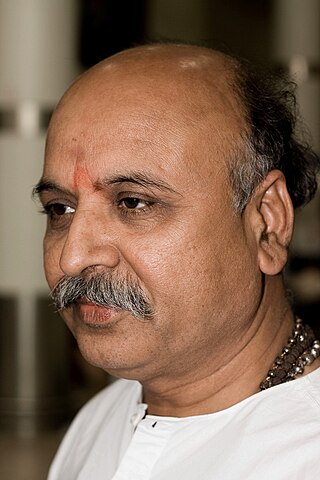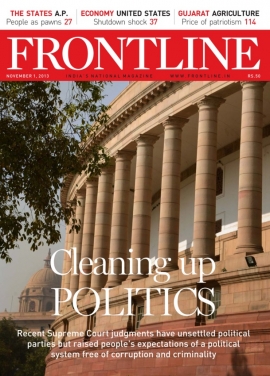Related Research Articles

Teesta Setalvad is an Indian civil rights activist and journalist. She is the secretary of Citizens for Justice and Peace (CJP), an organisation formed to advocate for the victims of 2002 Gujarat riots.

Pravin Togadia is an Indian doctor, cancer surgeon and an advocate for Hindu nationalism, coming from the state of Gujarat. He was the former International Working President of the Vishva Hindu Parishad (VHP) and a cancer surgeon by qualification. He is Founder and Current President of Antarashtriya Hindu Parishad. He had a falling out with the Sangh Parivar and is a vocal critic of Narendra Modi.

Frontline is a fortnightly English language magazine published by The Hindu Group of publications headquartered in Chennai, India. Vaishna Roy is the editor of the magazine. It is a news and views magazine that provides in-depth coverage on various topics such as politics, world affairs, culture, science, health, business and personalities. Frontline gives coverage to developmental issues and issues related to the working classes, unorganized sectors, tribal regions and other under-served regions in India.
The Godhra train burning occurred on the morning of 27 February 2002: 59 Hindu pilgrims and karsevaks returning from Ayodhya were killed in a fire inside the Sabarmati Express near the Godhra railway station in the Indian state of Gujarat. The cause of the fire remains disputed. The Gujarat riots, in which Muslims were the targets of widespread and severe violence, occurred shortly afterward.

The 2002 Gujarat riots, also known as the 2002 Gujarat violence or the Gujarat pogrom, was a three-day period of inter-communal violence in the western Indian state of Gujarat. The burning of a train in Godhra on 27 February 2002, which caused the deaths of 58 Hindu pilgrims and karsevaks returning from Ayodhya, is cited as having instigated the violence. Following the initial riot incidents, there were further outbreaks of violence in Ahmedabad for three months; statewide, there were further outbreaks of violence against the minority Muslim population of Gujarat for the next year.
Final Solution documentary film directed by Rakesh Sharma concerning the 2002 Gujarat riots in the state of Gujarat in which 254 Hindus and 790 Muslims were killed. Hindu right-wing organizations were made responsible for these riots, which took place as a "spontaneous response" to the killing of 70 Hindu pilgrims in the Godhra Train Burning by a mob of radical Muslims on 27 February 2002. But as the film proceeds with victims continuing to come forward and share their experiences, a more unsettling possibility seems to emerge- that far from being a spontaneous expression of outrage. The makers of the film claim that the violence had been carefully coordinated and planned.
Dionne Bunsha is Climate and Conservation Engagement Coordinator at the University of British Columbia Botanical Gardens in Canada. She was a prominent journalist in India.
Religious violence in India includes acts of violence by followers of one religious group against followers and institutions of another religious group, often in the form of rioting. Religious violence in India has generally involved Hindus and Muslims.

Anti-Christian violence in India is religiously motivated violence against Christians in India. Human Rights Watch has classified violence against Christians in India as a tactic used by the right-wing Sangh Parivar organizations to encourage and exploit communal violence in furtherance of their political ends. The acts of violence include arson of churches, conversion of Christians by force, physical violence, sexual assaults, murders, rapes, and the destruction of Christian schools, colleges, and cemeteries.

Babubhai Patel, known by his alias Babu Bajrangi, was a leader of the Gujarat-wing of the Bajrang Dal, a Hindu right wing organization in India. He was a central figure during the 2002 Gujarat violence. He was sentenced to life term imprisonment by a special court for his role in masterminding the Naroda Patiya massacre in which 97 Muslims were murdered including 36 women, 26 men and 35 children. The Supreme Court of India granted him bail on medical grounds in March 2019.

Ram Puniyani is an Indian author, former professor of biomedical engineering and former senior medical officer affiliated with the Indian Institute of Technology Bombay. He began his medical career in 1973 and served IIT in various capacities for 27 years, beginning in 1977. He has been involved with human rights activities and initiatives to oppose Hindu fundamentalism in India and is currently the President of the Executive Council of the Centre for Study of Society and Secularism (CSSS). He is also an advisory board member of the Muslim Mirror.

Vishva Hindu Parishad (VHP) is an Indian far-right Hindu organisation based on Hindu nationalism. The VHP was founded in 1964 by M. S. Golwalkar and S. S. Apte in collaboration with Swami Chinmayananda. Its stated objective is "to organise, consolidate the Hindu society and to serve and protect the Hindu Dharma". It was established to construct and renovate Hindu temples, and deal with matters of cow slaughter and religious conversion. The VHP is a member of the Sangh Parivar group, the family of Hindu nationalist organisations led by the RSS.
The 2006 Vadodara riots also known as the 2006 Dargah riots occurred on 1 May of that year in the city of Vadodara in the state of Gujarat in India. The riots were caused by the municipal council's decision to remove the dargah (shrine) of Syed Chishti Rashiduddin, a medieval Sufi saint. The shrine was between two and three hundred years old. The incident resulted in six to eight people being killed and forty-two injured, 16 of these were from police shooting.

The Naroda Patiya massacre took place on 28 February 2002 at Naroda, in Ahmedabad, India, during the 2002 Gujarat riots. 97 Muslims were killed by a mob of approximately 5,000 people, organised by the Bajrang Dal, a wing of the Vishva Hindu Parishad, and allegedly supported by the Bharatiya Janata Party which was in power in the Gujarat State Government. The massacre at Naroda occurred during the bandh (strike) called by Vishwa Hindu Parishad a day after the Godhra train burning. The riot lasted over 10 hours, during which the mob plundered, stabbed, sexually assaulted, gang-raped and burnt people individually and in groups. After the conflict, a curfew was imposed in the state and Indian Army troops were called in to contain further violence.

The 1969 Gujarat riots involved communal violence between Hindus and Muslims during September–October 1969, in Gujarat, India. The violence was Gujarat's first major riot that involved massacre, arson, and looting on a large scale. It was the most deadly Hindu-Muslim violence since the partition of India in 1947, and remained so until the 1989 Bhagalpur violence.
The Nanavati-Mehta Commission is the commission of inquiry appointed by the government of Gujarat to probe the Godhra train burning incident of 27 February 2002. Its mandate was later enlarged to include the investigation of the 2002 Gujarat riots. It was appointed on 6 March 2002, with K. G. Shah, a retired Gujarat High Court judge, as its only member. It was later re-constituted to include G. T. Nanavati, a retired judge of the Supreme Court of India, after protests from human rights organizations over Shah's closeness to then-Gujarat Chief Minister Narendra Modi. Akshay H. Mehta, retired judge of the Gujarat High Court, replaced Shah when the latter died before the submission of the commission's interim report. Mehta was the same judge who had granted bail to Babu Bajrangi, the main accused of the Naroda Patiya massacre.
There have been several instances of religious violence against Muslims since the partition of India in 1947, frequently in the form of violent attacks on Muslims by Hindu nationalist mobs that form a pattern of sporadic sectarian violence between the Hindu and Muslim communities. Over 10,000 people have been killed in Hindu-Muslim communal violence since 1950 in 6,933 instances of communal violence between 1954 and 1982.
Jaideep Patel is a medical doctor who runs a pathology lab in Naroda, Ahmedabad, Gujarat in India. He served as the Gujarat state general secretary for Vishwa Hindu Parishad (VHP), a Hindu nationalist organisation, during the 2002 Gujarat riots.

Rana Ayyub is an Indian journalist and opinion columnist with The Washington Post. She is author of the investigative book Gujarat Files: Anatomy of a Cover Up.

The Ramnath Goenka Excellence in Journalism Awards are one of the awards in India in the field of journalism. Named after Ramnath Goenka, the awards have been held annually since 2006, with the 12th edition being held in 2017. The awards are given for both print journalism as well as broadcast journalism, with a total of 25 different prizes being awarded in 2017 for excellence in journalism during 2016. In Fact Indian Express group started, Ramnath Goenka India Press Photo Award in 2004. This award was only for media photographers and the winners was announced in December 2004 at Nariman House, Express tower in Mumbai and Photo Journalist Shailendra Pandey won The First Picture of the year award.
References
- ↑ Dobhal, Harsh (2011). Writings on Human Rights, Law, and Society in India: A Combat Law Anthology : Selections from Combat Law, 2002-2010. Socio Legal Information Cent. ISBN 978-81-89479-78-7.
- ↑ "Scarred Experiments with violence in Gujarat". New Internationalist (394): 27–27. October 2006.